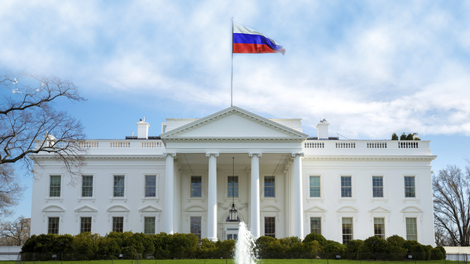
Former White House National Security Advisor Michael Flynn may have lied to the FBI about talking to Russia’s ambassador regarding U.S. sanctions, possibly breaking several laws that could land him behind bars. Why is that? It all goes back to a law from America’s earliest years as a nation, but the chances that Flynn could actually be prosecuted seem slim.
As The Washington Postreports, during his interview with the FBI on January 24, Flynn denied discussing sanctions with Russian Ambassador Sergey Kislyak following President Donald Trump’s election. This contradicts intercepts of his calls collected by U.S. intelligence agencies. Lying to the feds is a federal crime and can lead to time behind bars, if convicted.
In the end, it would be up to the Justice Department to prosecute Flynn. But he may not spend a day in jail because he could, for instance, be loose about the word “sanctions,” suggesting that he wasn’t exactly trying to advance U.S. policy interests during his conversations with the Russian diplomat. He can also claim he can’t recall all of the conversation.
Advertisement
Advertisement
But if the Justice Department pursues a prosecution, let’s discuss the two laws they could accuse Flynn of breaking. The most common law that has been circulating in news reports is the Logan Act. This forbids any private citizen from engaging in foreign policy business without the permission of the federal government. (For his part, Trump said during his press conference on Thursday that he did not tell Flynn to talk to Kislyak, but “I would have directed him because that’s his job.”)
Here is how the Logan Act reads, in part:
Any citizen of the United States, wherever he may be, who, without authority of the United States, directly or indirectly commences or carries on any correspondence or intercourse with any foreign government or any officer or agent thereof, with intent to influence the measures or conduct of any foreign government or of any officer or agent thereof, in relation to any disputes or controversies with the United States, or to defeat the measures of the United States, shall be fined under this title or imprisoned not more than three years, or both.
Based on this reading, one might fathom that Flynn could have broken the law. But officials told the Post that while Flynn and the ambassador did discuss sanctions, it did not appear that the former national security advisor promised him anything.
Sponsored
At the same time, it is unlikely that Flynn will be prosecuted under the act because the law is pretty vague, as Noah Feldman, a constitutional lawyer at Harvard, explained in Bloomberg:
The law doesn’t define “disputes or controversies” between the foreign country and the U.S., nor does it say what it means to “defeat the measures of the U.S.”
That’s enough to make the statute unconstitutionally vague. What if I am simply speaking as a private citizen to the prime minister of a foreign country about its relations with the U.S. and those relations sometimes involve disagreement? Am I committing a crime, even if I’m not purporting to do diplomacy?
And what would it mean for me to be trying to “defeat” U.S. measures? Does that include trying to convince the foreign government that it shouldn’t agree with U.S. policy?
If a criminal law doesn’t clearly specify what actions would be criminal, it’s unconstitutional to apply it.
So, forget the Logan Act. What about simply lying to the FBI? Page Pate, a criminal defense and constitutional lawyer, wrote in CNN that his is what Flynn should be worried about. Prosecutions against individuals making false statements occur often:
Advertisement
Based on what’s been reported, it appears that he did. At some point, it appears that Flynn told Vice President Pence that his discussions with the Russian ambassador did not involve the recently imposed sanctions.
That statement was made to a government official, concerned a matter within the jurisdiction of the federal government, and now appears to be false. The only questions are whether Flynn intended to lie or just made an honest mistake, and whether any false statement he may have made was intended to impair the government’s investigation of his discussions with the Russians.
Flynn has claimed that he “isn’t completely certain” about whether his discussions with the Russian ambassador included any mention of the sanctions. That seems incredible to me. At the time, Flynn was expecting to become the national security adviser to the incoming president.
The timing of the call suggests it was made in response to the sanctions that had just been announced by President Obama, and in an attempt to assure Russia that Trump had no intention of continuing the sanctions once he was in office, so there would be no need for Russia to retaliate with sanctions of its own. Russia seemed to have gotten the message because Vladimir Putin later announced there would be no new sanctions imposed against the US.
Another factor to consider here: Jeff Sessions, Trump’s Attorney General, would have to approve such a prosecution. It seems very hard to imagine a case where he would. This is a case where politics may trump the law, which some Flynn critics will no doubt see as unfortunate. As obscure as the Logan Act is, it was created for a reason.
Advertisement
It actually dates back to post-Revolution America, when the country was young and still sorting out its diplomatic endeavors. The man it’s named after was a lawmaker who conducted diplomacy without official sanctioning, which as you might expect created a lot of problems for the young U.S. Here is a brief history of why the law was created, per NPR:
It’s named for Dr. George Logan, a Democratic-Republican Party lawmaker from Pennsylvania, who traveled to France in 1798 and negotiated a lifting of an embargo and the release of American sailors held captive in French prisons. He did so without the permission of President John Adams, though he was a friend of then-Vice President Thomas Jefferson.
It was after the French Revolution, and the United States didn’t help France because of a treaty with England. The French were upset and began robbing passing American ships and jailing its sailors. Official Adams administration envoys tried unsuccessfully to settle the unrest with France — and the country appeared tumbling toward war with France.
That’s when Logan, a Quaker, embarked on his effort. He succeeded, but when he got back to the U.S., Adams, Washington and others were furious. Congress then acted to bar actions like Logan’s from taking place again.
Bottom line: the law is in place so that the average joe off the street can’t go behind the American government’s back and undermine its foreign policy. The U.S. was in its infancy at the signing of the 1799 law, and it was essential to ensure that America operated as one unit. Logan, the Quaker, may have had good intentions, but he was operating well above his pay grade and damaged U.S. diplomacy in the process.
Advertisement
It’s the same with Flynn. He may not have been an average joe, but he certainly was not permitted to represent U.S. interests to a Russian diplomat. As former acting Attorney General Sally Yates warned, Flynn could have compromised America because the Russians could have mischaracterized the call. Vice President Mike Pence repeated Flynn’s claim that he didn’t discuss sanctions on major TV networks and then had to walk it back.
The Logan Act may be a flawed law in today’s times—and even back then—but its intent was clear: don’t talk to foreign governments without permission. Doing so can undermine U.S. diplomacy. Or, in the case of Flynn and Trump, it can make America look compromised by a foreign power, which is exactly what is happening.
















